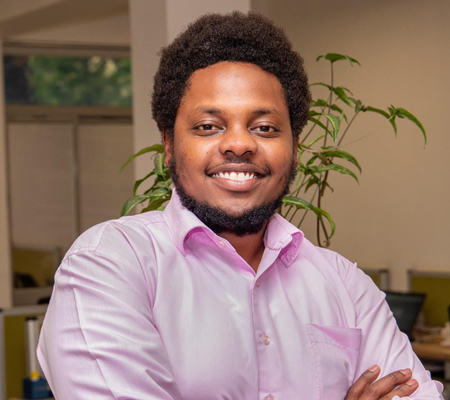In the kick off to their various trainings, the 2020/2021 Innovators-in-Residence cohort of LAM Sisterhood from Kenya, Minority Africa from Uganda and Ona Stories from Tanzania, underwent a Lean Canvas Model (LCM) training that will enable them ideate, describe, evaluate and discuss a business model using the Lean Canvas Model.
Making her opening remarks, Director Innovation Centre, Dr Njoki Chege, emphasized on the importance of the training to the start-ups that seeks to offer guidance as they start building their way up.
“I am pleased to announce a successful LCM training for our 2020/2021 cohort. This particular training is aimed at providing a practical and agile way of coming up with a business plan for innovative entrepreneurs, while providing a hands-on understanding of presenting one’s start-up problem, and other start-up scenarios, to articulate their business model,” said Dr Chege.
Dr Chege further reiterated the importance of the trainings that will be offered to the cohorts, and community members, stating the sessions will go a very long way in benefiting their growth.
“Other than the grant, we saw it best to provide a vast set of trainings that will equip the founders with the necessary knowledge and skills to run their business. The trainings are a combination of business and journalistic to attain the right know-how balance of running a media start-up,” added Dr Chege.
Making their comments after the trainings, Princely Glorious from Ona Stories, emphasized on the value of the LCM training that helped the team figure out where the gaps were in their business model.
“The LCM training was immensely valuable for my team and I. The activity helped us synthesize our strategy into an easy-to-understand, bite size pitch and helped us figure out where the gaps in our current business model might be and develop a model we’re proud of and aligned with our market,” said Princely.
Laura Ekumbo from LAM Sisterhood applauded the quality of the instructor and highlighted the value of the training to their start-up that made it easier to understand what the outputs were while Caleb Okereke highlighted the importance of the training in visualizing the blue print of their business success.
The LCM kicked off a series of training that the IiR are taken through in their 12 months’ residency. The next training will be Human Centered Design training that focuses on helping start-ups develop a user centered product with others like financial planning training focusing on financial management.
 Caleb Chuma
Caleb ChumaReport by Aga Khan University’s Media Innovation Centre analyses the country’s millennials and digital natives’ media consumption habits.
That’s why I think today is such a great space for us to sit back and reflect on the questions that could help us shape the kind of journalism that we want to see in our local and global community.
The report specifically analysed eight major variables which include: newsroom structure and resources, media ownership and business models, organisational capacity, innovation culture, journalism culture, financial trends and results, content quality and COVID-19.
Three media startups have graduated from the Innovators-in-Residence program when they pitched their ideas in a ‘demo day’ at the Media Challenge Initiative Hub in Uganda
The partnership will also ensure that local content is curated and distributed to better optimize the product and meet the needs of Kenyan online users.
A team of young, Tanzanian tech-savvy communication professionals is dreaming big. It seeks to usher a new dawn in media business management in Tanzania by optimising employee output
As Form One students settle into a new life in secondary school, this has also been a period of reflection. We have read tear-jerking and heart-warming stories of determined students who overcame many odds to get an education and how well-wishers came together in their aid.
A free and independent press is the cornerstone of any democracy and the foundation of economic success, mostly because through our free press, we’re able to hold the leadership to account.
The three-day event, held simultaneously in Kenya, Uganda and Tanzania, was crucial in taking the teams through the necessary dos and don’ts as well as introduce coaches, trainers and mentors that will walk with them through the programme and curriculum.
Started in 2019, the MiC plays a significant role in mainly supporting the next generation of media entrepreneurs in Tanzania, Kenya and Uganda through trainings, mentorships and start-up grants to bring about media viability.
Our new talk series, #ConversationsAtMiC, seeks to explore and tackle issues, challenges, and opportunities within the media startup industry. The series aims to invite guests who would empower media startups to grow and develop further.
It is time for those in Kenyan media leadership to declare journalists’ mental health an industry-wide crisis. It is a fact that we like to sweep under the rag, but Kenyan journalists need a lot of psychosocial support.
The Media Innovation Centre analyzed the applications to demonstrate the need for Media Innovation support in the region and a call to organisations, governments, and philanthropists to fund media start-ups in East Africa through grants.
Put in context, it is safe to argue that the plural media in Kenya could be in the business of reaching the audience and not necessarily serving this audience with public interest, local news.
The Hub intends to provide high-quality media support services such as co-working space, hosting events, and dialogues for media innovators who are intentional about creating solutions to journalism’s challenges.
Girls must grow up knowing that they can be presidents, engineers, CEOs, and we as a society must learn to be comfortable with women working in traditionally male-dominated professions.
We must give context and background to audiences about what the news means to them or what it means to specific groups of people.